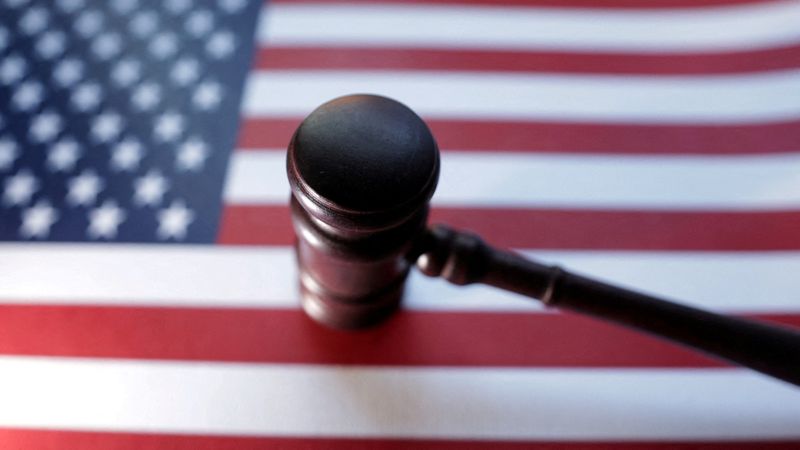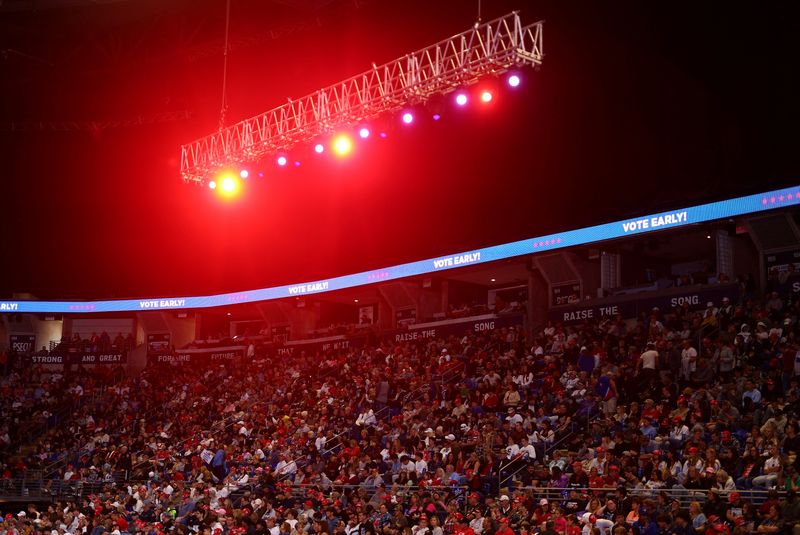Stock Markets
Republican battleground state legal blitz falters ahead of US presidential election

By Jack Queen
(Reuters) -Donald Trump’s Republican allies have suffered a string of courtroom setbacks in battleground U.S. presidential election states as Election Day draws closer, losses that could boost voter turnout and speed certification of the eventual winner.
In the past three weeks, Trump’s allies have been dealt at least 10 court losses in battleground states that could decide the outcome of the Nov. 5 contest between Republican former President Trump and his Democratic rival, Vice President Kamala Harris.
On Friday, they were dealt another loss in Virginia, when a federal judge blocked the state’s removal of people it said had not proved their citizenship from its voter rolls.
U.S. District Judge Patricia Tolliver Giles said the removal ran afoul of a federal prohibition on purging large numbers of voters in the 90 days before an election. The state, which is not a swing state this election, said it would appeal.
The other decisions include four rulings against Republicans in Georgia, where judges have blocked last-minute changes to election rules championed by Trump’s allies, including one that would have required poll workers to hand count ballots, as well as cases seeking to purge voter rolls and block some Americans who are living overseas from voting.
The party’s recent losses suggest its legal strategy is coming up short in court, which some legal experts said will likely be a net positive for voter turnout. The losses in Georgia, meanwhile, will likely make it easier for officials there to quickly count and certify vote totals, the experts said.
“If courts had accepted some of these arguments, it could have had a huge impact on voter disenfranchisement,” said Richard Hasen, a law professor at the University of California, Los Angeles.
In one of a handful of wins for Republicans, the 5th U.S. Circuit Court of Appeals on Friday ruled that mail-in ballots can only be counted if they are received by Election Day, invalidating Mississippi’s five-day grace period. Mississippi is not a swing state, and the ruling does not directly apply to any battleground states.
The Republican court losses undermine what party members say are efforts to tighten election security measures to prevent fraud, which Trump falsely claims cost him the 2020 election.
Democrats and voting rights groups have accused Republicans of trying to make it harder for people to cast ballots and for officials to count them.
Some of the cases could be reversed on appeal and other election cases brought by Republicans are pending.
Republican National Committee spokeswoman Claire Zunk defended the party’s legal record in a statement and said it will continue to “fight for a fair and transparent election for all Americans.”
“Our unprecedented election integrity operation is committed to defending the law and protecting every legal vote. We have engaged, and won, in record numbers of legal battles to secure our election,” Zunk said.
A Harris campaign spokesman said in a statement that Republicans are using lawsuits to stoke baseless fears about election security.
“For months, MAGA Republicans have tried to exploit our legal system for free PR to broadcast lies about our free, fair and secure elections, but they failed to provide a single shred of evidence for their bogus claims,” spokesman Charles Lutvak said.
There have been 265 election-related lawsuits filed this election cycle, including 71 filed by Republicans and their allies, according to election litigation tracking website Democracy Docket, founded by Democratic election lawyer Marc Elias.
In addition to the Mississippi win, Republicans have touted at least a half-dozen legal victories since August. Those include blocking a voter registration deadline extension in Georgia, forcing Michigan to tighten signature verification measures and preventing the use of digital university IDs to vote in North Carolina.
SETBACKS IN GEORGIA
But the past several weeks have seen a series of major setbacks for Republicans, particularly in Georgia.
A state court judge ruled on Oct. 15 that local election officials must certify results, rejecting a Republican election board member’s claim that she had discretion not to. The official, Julie Adams, is appealing.
The judge, Robert McBurney, issued an order in a separate case the following day that blocked the Georgia hand count rule from taking effect, saying the change had been made too close to the election.
In a third case, Superior Court Judge Thomas Cox invalidated the hand count rule and six other changes pushed through by Trump’s allies on the state election board, saying they violated state law.
Georgia’s highest court on Tuesday rejected a Republican request to fast-track its appeal of Cox’s ruling, meaning the case will not be resolved until next year.
Zunk said the rule changes were “commonsense measures to safeguard our elections” and that Republicans are confident they will prevail on appeal.
In his ruling, Cox said the board overstepped its authority with the 11th-hour rule changes, declaring them “illegal, unconstitutional, and void.”
Judges applied similar reasoning in rejecting lawsuits seeking to purge voter rolls of allegedly ineligible or non-citizen voters in recent weeks in Arizona, Nevada, North Carolina and Michigan, finding that the cases were filed too close to the election.
In addition to the federal law prohibiting systematic purges of voter rolls 90 days or less before an election, longstanding court precedent holds that judges should avoid making last-minute changes to election rules to prevent voter confusion.
Republicans are appealing those decisions.
Other judges in battleground states have ruled against Republicans in cases seeking to restrict overseas voting.
On Oct. 21, a Michigan judge tossed a lawsuit seeking to tighten residency requirements for overseas absentee ballots, saying the case lacked merit and was filed too late.
That same day, a North Carolina judge denied a Republican bid for an initial order preventing North Carolina from using similar eligibility rules for overseas voters.
“We are appealing both decisions in Michigan and North Carolina because the law in both states is clear: If you’ve never lived there, you can’t influence their elections,” Zunk said.
BUTTRESSING CLAIMS OF FRAUD?
Hasen and other legal experts said many of the Republican lawsuits were likely to fail from the beginning and could be aimed primarily at sowing doubt about the election’s legitimacy and amplifying Trump’s claims of fraud.

Paul Smith, a Georgetown Law professor and senior vice president of the nonpartisan Campaign Legal Center, said the early court losses may actually further Republicans’ strategy of spreading fears about voter fraud that could be leveraged to challenge the results if Trump loses.
“What they’re likely going to do is bring up these claims of fraud not so much as legal issues but to feed whatever disruptive plan they have to mess with vote counting and mess with certification,” Smith said.
Stock Markets
Suburban Propane director Logan sells $139k in shares
Stock Markets
Stock market today: S&P 500 closes lower, but posts big weekly win
Stock Markets
TD Bank promotes Laura Nitti to retail market president role

 Forex3 years ago
Forex3 years agoForex Today: the dollar is gaining strength amid gloomy sentiment at the start of the Fed’s week

 Forex3 years ago
Forex3 years agoUnbiased review of Pocket Option broker

 Forex3 years ago
Forex3 years agoDollar to pound sterling exchange rate today: Pound plummeted to its lowest since 1985

 Forex3 years ago
Forex3 years agoHow is the Australian dollar doing today?

 Cryptocurrency3 years ago
Cryptocurrency3 years agoWhat happened in the crypto market – current events today

 World3 years ago
World3 years agoWhy are modern video games an art form?

 Commodities3 years ago
Commodities3 years agoCopper continues to fall in price on expectations of lower demand in China

 Economy3 years ago
Economy3 years agoCrude oil tankers double in price due to EU anti-Russian sanctions





















